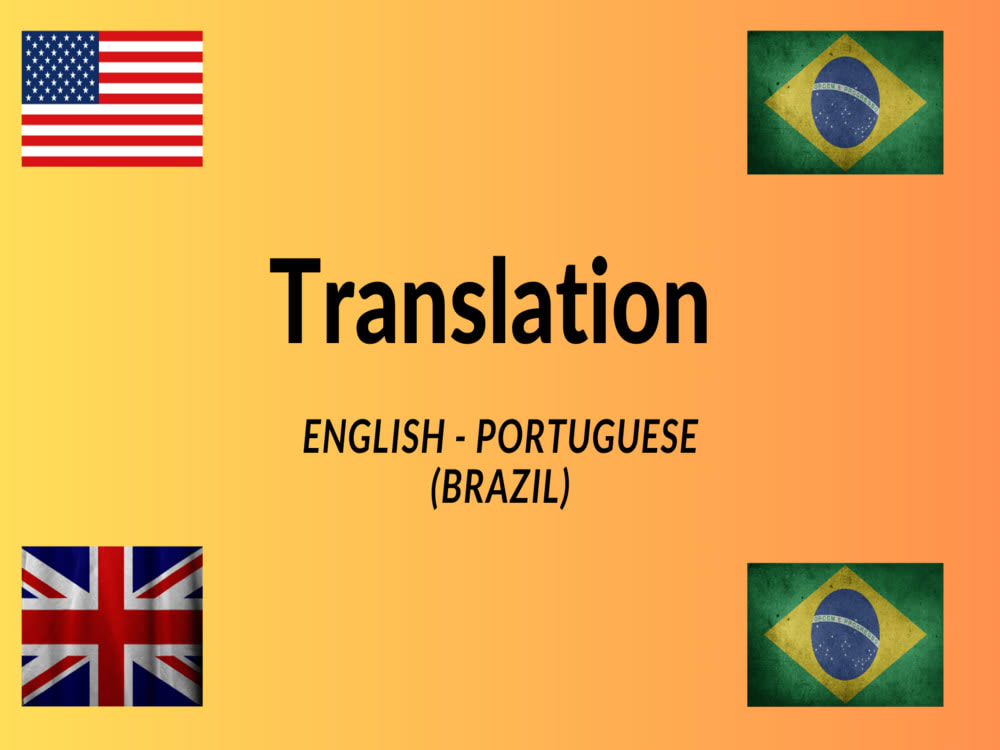Top English To Portuguese Translation Solutions for Your Demands
Wiki Article
Leading Tips for Perfect English to Portuguese Translation Solutions
Accomplishing outstanding English to Portuguese translation needs more than mere word-for-word conversion; it requires an understanding of cultural subtleties and linguistic complexities. Picking qualified translators who are both well-versed and culturally conscious is critical - English To Portuguese Translation. What other essential aspects should be considered to boost translation high quality better?Understand Cultural Nuances
When equating from English to Portuguese, understanding the social nuances is essential for creating a powerful and accurate message. The Portuguese-speaking world varies, including various areas, each with its distinct personalizeds, idioms, and social standards. A translator has to be attuned to these nuances to make sure that the translation not only communicates the desired message however also reverberates with the target audience.For circumstances, colloquial expressions in English may not have straight counterparts in Portuguese. An expression that works well in one culture can lead to confusion or false impression in one more. Recognizing regional dialects and variations, such as those found in Brazil and Portugal, is essential; words might hold various connotations or usages relying on the locale.
Additionally, cultural context plays a significant duty in translation. Ultimately, a comprehensive understanding of cultural nuances is important for providing translations that are not just linguistically exact yet additionally culturally pertinent and interesting.
Pick Qualified Translators
Choosing qualified translators is a critical action in ensuring the precision and high quality of English to Portuguese translations. A translator's experience not just incorporates language effectiveness however likewise a deep understanding of cultural context, colloquial expressions, and industry-specific terms. When selecting a translator, prioritize those with formal training in translation researches or grammars, in addition to relevant certifications that demonstrate their specialist skills.Experience plays a critical duty as well; translators concentrating on particular fields-- such as legal, clinical, or technical-- are more probable to deliver precise translations customized to the market's standards (English To Portuguese Translation). Additionally, consider their profile and customer endorsements to examine their previous work top quality and dependability
Engage translators who are indigenous Portuguese audio speakers, as they possess a natural understanding of the language's nuances and local dialects. This familiarity boosts the translation's credibility and effectiveness.
Usage Contextual References

When converting, it is important to acknowledge colloquial expressions and cultural recommendations that might not have direct equivalents in Portuguese. For circumstances, specific expressions that reverberate in English might need adjustment to convey the exact same psychological weight or social importance in Portuguese. Utilizing contextual referrals can aid translators choose the best terms and design, thus enhancing the overall quality and impact of the translation.

Focus on Localization
Localization plays a vital duty in the translation procedure from English to Portuguese, as it makes certain that the equated material is appropriate and culturally suitable to the target market. English To Portuguese Translation. This procedure goes past simple translation; it involves adapting the learn the facts here now web content to the social, social, and etymological subtleties specific to Portuguese-speaking areasUnderstanding neighborhood idioms, custom-mades, and choices is important. Specific phrases or recommendations that reverberate with an English-speaking audience might not have the exact same effect on Portuguese audio speakers. It is important to think about regional variations, such as Brazilian Portuguese versus European Portuguese, as each has distinct vocabulary and stylistic differences.
Additionally, localization incorporates formatting, such as date and time styles, money, and measurement units, which can vary significantly throughout cultures. This focus to detail promotes a connection with the audience, enhancing engagement and understanding.
Furthermore, using regional languages and slang can offer credibility, making the web content much more relatable. By concentrating on localization in English to Portuguese translation, businesses can effectively communicate their message, build trust fund with their audience, and eventually accomplish their intended objectives.
Testimonial and Edit Extensively
Thorough review and modifying are essential steps in the translation procedure, particularly when converting English material into Portuguese. This additional reading stage makes certain that the converted material not just maintains the initial definition yet additionally resonates well with the target audience. Given the linguistic and cultural nuances, a careful technique to evaluate and modifying is essential.Begin by comparing the original English message with the Portuguese translation, paying very close attention to context, terminology, and tone. It's vital to guarantee that idiomatic expressions and social references are properly adjusted for the Portuguese audience. Engaging a second translator or an indigenous audio speaker for this evaluation procedure can give very useful understandings and capture errors that may have been overlooked.
Furthermore, check for grammatic accuracy and stylistic uniformity throughout the record. Usual difficulties such as incorrect cognates or uncertain phrases must be resolved to prevent misconception.
Conclusion
Attaining extraordinary English to Portuguese translation services demands a thorough technique that encompasses understanding social nuances, selecting certified translators, utilizing contextual references, focusing on localization, and carrying out comprehensive testimonials and edits. Each this page aspect plays a vital function in ensuring that translations are not just exact but additionally resonate with the target market. By executing these approaches, organizations can boost the efficiency of their interaction and promote a much deeper connection with Portuguese-speaking target markets.Achieving remarkable English to Portuguese translation calls for more than simple word-for-word conversion; it requires an understanding of linguistic ins and outs and social nuances.Choosing certified translators is a vital action in making sure the precision and quality of English to Portuguese translations.Thorough evaluation and editing and enhancing are crucial actions in the translation process, specifically when converting English material right into Portuguese.Begin by contrasting the original English text with the Portuguese translation, paying close interest to context, tone, and terminology.Accomplishing phenomenal English to Portuguese translation solutions necessitates a detailed approach that includes understanding social subtleties, selecting qualified translators, making use of contextual references, prioritizing localization, and carrying out detailed reviews and edits.
Report this wiki page